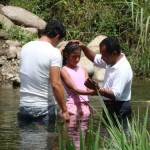Grace to be wrong
About three and a half years ago, I wrote this post called “Grace to be wrong.” I try to remember this whenever I think someone is wrong. I also try to remember that I may be the one that is wrong. God has changed my mind about many things. I must give God the space to change others as well… if he so chooses.
——————————————-
I’m wrong. There are things that I believe with the utmost confidence, but some of these beliefs are wrong. How do I know that I’m wrong? Because I’m not perfect. I may be wrong in some of my beliefs about God. I may be wrong in some of my beliefs about the church. I may be wrong in some my beliefs about other people. I may be wrong about what it means to be mature. I may be wrong about what it means to be wrong. I don’t know exactly what points of my beliefs are wrong, but I know that some of them are wrong.
Paul told the Philippians that he wanted to know Christ and everything about Christ (Philippians 3:7-11). He wanted to share in Christ’s life, suffering, death, and resurrection. But, Paul also recognized that he was not “there” yet (Philippians 3:12-14). He was still on the journey toward knowing God – and knowing him more.
Paul also recognized that some of the people in Philippi were not as far along on their journey to know God more. He wanted them to know God, and so he spent time with them and wrote them a letter to help them know God. But, he recognized that the Philippians would not know God simply because Paul told them about God. They would only know God as God revealed himself to them. Thus, instead of forcing his knowledge about God on the Philippians, Paul recognized their need of God himself and his grace:
Let those of us who are mature think this way, and if in anything you think otherwise, God will reveal that also to you. (Philippians 3:15 ESV)
Perhaps there were some in Philippi who did know God as they should. Perhaps there were some in Philippi who cared more about their own desires than the desires of God. What was Paul’s answer to this problem? Paul taught them about God, then he trusted God to reveal this to them. Paul trusted God’s grace, even when he thought others were wrong. Yes, Paul stated his understanding about God very clearly – he taught. However, he did not trust his own teaching to change anyone. He trusted God’s grace.
Paul knew (as he had told the Philippians earlier in the letter) that despite his own actions in teaching and modeling the life of Christ, it was God himself who worked in the Philippians to make them into the people that God wanted them to be. (Philippians 2:12-13) Thus, unless Paul wanted to try to usurp the authority and power of God, he had to trust God to change people. Paul had to trust God’s grace.
This is very difficult. This means that we have to allow people to be wrong. Do we state what we believe to be true? Yes. Do we show evidence from Scripture? Yes. Do we continue to browbeat someone to get them to agree with us? No. Do we attempt to force them to agree based on our position or maturity? No. Do we stop associating with them because they do not agree? No. Why? Grace.
When I look back on my life, I can see how much God has taught me by his Spirit. I can remember times where I held firmly to a position that God later showed me was incorrect. I can remember times when my feelings, emotions, or habits ruled me more than the Spirit of God. But God worked in me according to his will.
I have had teachers who taught really great things about God, but the teachers did not change me. I have read books that explained God and his ways, but the books did not change me. I’ve been in relationships with people who followed God, but even those relationships did not change me. God changed me – and he is continuing to change me.
Now, I should offer others the same grace – the grace to be changed by God, which includes the grace to be wrong. I must be willing to accept someone even when that person doesn’t agree with me, and trust God to change them. And, to prevent myself from becoming proud, I must also admit that God may be working to change me, and not them.
God loves us, and he pours out his grace on us, even when we are wrong. We demonstrate the character of God – Christ-likeness – when we love others and offer them grace when we think they are wrong.
Just a bag of groceries
Tonight, for the second time, my family plans to serve in a local food pantry. The food pantry is actually based out of another church building that meets near us. We’ve been invited to help.
We were all exhausted two weeks ago after helping deliver groceries and talk to people who came to the food pantry. But, the exhaustion was good, because we were doing more than simply delivering a bag of groceries. We were there to show the love of Christ to people who were in need.
Tonight, we’ve invited some friends to join us. We hope that some of them choose to do so.
We know that if more people join us it will be beneficial for the people who come to the food pantry. We’ll be able to talk to more people and pray with more people. More people will hear about God’s love and grace and mercy.
We also know that if more people join us, it will be beneficial for the people who join us. They will also come out exhausted: physically, emotionally, and spiritually drained. But the opportunity to serve others and tell others about the love of God in Jesus Christ is worth it.
If you’re in northern Wake County or southern Franklin County (NC), perhaps you can join us next time.
Pastoral worries
So, I’m an elder in our church – one of five elders, actually. I pastor, meaning that I care for people. Of course, many, many people who are part of our church pastor people. It’s hard to disciple without pastoring…. and we should all be discipling, right?
I’m not a professional pastor. I do not draw a salary because I am an elder or because I pastor. I do not “preach a sermon” every week. In fact, once again, many, many people who are part of our church take part in teaching. It’s hard to disciple without teaching… and we should all be discipling, right?
Lately, I’ve been paying attention to some of the comments (on Facebook or blogs or twitter) from other pastors. I’ve noticed a few things that cause pastors to worry… things that I don’t worry about because of our context.
For example, I don’t worry about getting fired because I say the wrong thing or because I take a stand on the wrong topic. (Even if I’m wrong.) I can’t be fired, because I was never hired. People follow me because they’ve decided that I’m a good example of one who is following Jesus Christ. We have many good examples who are part of our church.
I also don’t worry about what I’m going to “preach” each week. Even when it is my turn to teach or lead the discussion, “sermon preparation” is not even in view. Instead, we teach or discuss based on what we are all studying together. Imagine sitting around and talking about a certain topic or Scripture passage with a group of your friends, and then you have a good idea of what our times of teaching are like.
I don’t worry about getting someone to “fill in” for me when I’m sick or when I’m out of town. Why? Because I’m not the only one studying and “preparing” for our church meeting. I know that if I’m not present (as if my presence is necessary) there will be many others who can teach and lead the discussion.
I don’t worry about money and budget issues. Besides paying no salaries, we also fund no “ministries.” Oh, we use our money to minister to people, but not in the sense of needing to have a certain amount of money in order for some program to continue. If, for some reason, we do not have to money to rent the place where we’re currently meeting, we’ll simply find another place. We don’t let money rule what we do or don’t do.
Because of many of the above, I don’t worry about how many people meet with us each Sunday. I don’t have to worry about filling the pews (or chairs). I don’t have to worry about recruiting people to fill ministry program slots. I don’t have to worry about how much money people give.
Instead, I can focus all of my time and energy on people… caring for people… serving people… discipling people… teaching people… sharing my life with people.
Chosen for Mission
A few weeks ago, my friend Gary led our discussion on Sunday morning. We were talking about election and predestination.
Gary led us through several passages of Scripture that indicate that God’s children or chosen, elect, or predestined. Often, a phrase such as “from the foundation of the world” is added. The fact that God chooses some to be his children seems clear from Scripture.
Gary also led us through several passages of Scripture in which people are exhorted to choose, believe, trust, repent, receive, and accept. We could sum up these passages with Paul quotation from the OT: “Whoever calls on the name of the Lord will be saved.” From these passages, it is clear that God saves those who choose him.
In fact, we agree with both parts – God sovereignly chooses and people are responsible for choosing. While it seems contradictory to us, it is obviously not contradictory to God… or to Paul, or Peter, or James, or many of the other authors of Scriptures where both ideas are prominently found.
But, Gary did not end our discussion at this point. God chooses… so what? How does understanding election or predestination help us as God’s children? We talked about several points: the comfort, peace, hope, etc. that we have because God has chosen us.
Then, Gary brought up another point – a point that I had never associated with the idea of election. What point is that? Mission. He pointed us to this statement that Paul wrote to Timothy:
Remember Jesus Christ, risen from the dead, the offspring of David, as preached in my gospel, for which I am suffering, bound with chains as a criminal. But the word of God is not bound! Therefore I endure everything for the sake of the elect, that they also may obtain the salvation that is in Christ Jesus with eternal glory. (2 Timothy 2:8-10 ESV)
Paul writes that his work at proclaiming the gospel was “for the sake of the elect” (that is, for those who are chosen by God). Paul’s understanding of election did not drive him away from mission, but toward mission – running full speed toward mission.
As my 16 year old son, Jeremy, said that evening when we were talking about this as a family: “Didn’t Paul write many of the statements about election that we read? And, wasn’t Paul known as a great missionary? That alone should tell us that if we understood election the way that Paul understood it, we would me missionaries also!”
And, Jeremy is right. We are chosen from the foundation of the world. Yes, we are chosen to be God’s children and chosen for eternal life. But, we are also chosen to carry out God’s mission while we are still in the world. We do this for God and for the sake of other people who are elect, so that (as Paul said) that also may obtain the salvation that is in Christ Jesus.
Do you believe that God has chosen you as his child? Then, according to Paul, you are also chosen for mission.
A holy church
Arthur at “the voice of one crying out in suburbia” is putting a damper on some people’s holiness party with his post “A quick thought on holiness.” Arthur says that something is missing from many discussions of holiness: “how our holiness is lived out and impacts others.”
What?!? Has Arthur gone mad? Isn’t holiness all about our personal piety and our personal relationship with God?
Well, not according to Arthur:
Any exhibition of personal holiness that is not accompanied by substantive action and an urgent sense of compassion is not Biblical holiness. It is nothing more than self-righteousness.
We cannot speak of holiness in the church as something that is marked merely by personal acts of piety. An internalized holiness is not holiness in any true sense but we have created a norm that sees religious observation as the pinnacle of holiness. (emphasis in original)
All sarcasm aside… I completely agree with Arthur.
If your “personal devotion” and holiness do not lead you to demonstrate love toward others and serve others, then you are not listening to God nor are you following Jesus.
But, what about for a church? The same is true…
If your church meeting (worship service, mass, whatever you want to call it) do not lead you (y’all – i.e., individually and together) to demonstrate love toward others and serve others, then you are not listening to God nor are you following Jesus.
Taking the Next Step
A couple of weeks ago, I wrote a post called “The Next Step.” In that post, I talked about how important it is for us to talk about service and to encourage one another to serve others. But, I wondered out loud what it would look like – and what it would mean for the church – if we actually took the next step and left to serve others directly from our meeting together.
This is what I called “the next step” – the step away from concept and toward action. The step away from talking about discipleship and service toward actually discipling and serving others. I wrote:
Imagine, we’re sitting together as the church (either around tables or in a circle), and someone expresses a struggle with sharing the gospel with a neighbor. We encourage the person and pray for him or her. Then – the next step – someone offers to go with that brother or sister (perhaps at that very moment) to share the gospel with the neighbor. Or, perhaps someone else offers to take the struggling brother or sister along on a trip to the food pantry when the gospel is often shared.
There are so many possibilities, but it means taking the next step – the step away from concept and toward action.
Well, last Sunday, we started taking that step.
During the month of November, out teaching/discussions on Sundays with the church have focused on the great commandment and the great commission. We’ve primarily exhorted and challenged one another to think about how we can take the community that we share in Christ out to others. We’ve talked about taking our “shared life in Christ” to those who are also in Christ but do not share community with others, and we’ve talked about taking our community to those who are not believers.
Last Sunday, Rodney was planning to lead our teaching/discussion time. He sent an email before Sunday letting everyone know what we would be talking about, so that we could all come prepared. Here is part of his email:
How can we, practically and specifically, help each other to abide in Chirst (and thereby fuel our love for God and our love and service to others in the name of Christ)? To help us be practical and specific… what ways have others helped you grow in your faith, trust, and obedience to Christ? And in what other ways could others help you? (emphasis in original email)
So, when we got together, we did talk about practical and specific way that we could help others and ways that we could be helped. Several people shared opportunities that they’d had in the last couple of weeks to demonstrate the love of God, or times when they’d witnessed and been encouraged by others as they loved and served in the name of Jesus.
Slowly, a few people began making suggestions about how we could specifically serve others. One sister told about an opportunity to spend time in a local hospital. Another sister shared about a family who was having financial problems. A brother shared about his neighbor. A couple of sisters talked about the elderly people they see during the week. The church could serve all of these people in some ways.
Then, a young lady – a teenager actually – spoke up. She had gone with us when we had provided “More Meals” to some of the needy people in our area. She remembered that one of the elderly ladies that we had visited needed her yard raked.
And, this is where we took “the next step.” Margaret, my wife, suggested that whoever was available that afternoon could go to this lady’s house and rake her leaves. Everyone thought this was a great idea! So, we ate lunch together, then several of us (about 14) went to the lady’s and raked the leaves in her yard.
The lady was so surprised and grateful! Margaret and another friend (and our daughters) will continue to see this lady and her husband at least once per week. They will continue to be able to impact their lives with the love of Christ. And, now, because we took the next step, the whole community is involved in this couple’s life!
I’m praying that we continue to take the next step.
He really “got it”
A friend of ours has lived in Europe for the last two years. She will often send us email updates and prayer requests. Often, these emails tell us about the people that God has brought into her life.
Recently, I received an email from our friend with some wonderful news! One of her European friends had recently confessed Jesus Christ as Lord, and she wanted to share the news with us.
I asked her if I could share this story on my blog, and she consented. Here is part of the story:
S. was one through whom we were allowed to reap the harvest. He had been searching for a while and personally has a lot of interest in ideas, reading “literature” (such as the bible) and talking about spiritual things. He had always been very critical of what he grew up seeing in the Catholic Church and knew that what they present could not be the full truth. In the last year, God has brought several believers in his life through work and various other venues. He got to know a couple, G. and E., who are evangelical believers. E. is a professional cyclist and is also a member of our Christian athletes group. S., being a 26 year old sports journalist, met E. through work and recently wrote a book on his biography as an athlete.
I met S. one weekend in August at G. and E.’s house outside of our city. That weekend we were able to have several spiritual conversations and S. asked many questions, proving to have a soft heart desiring to understand the truth. We found out we lived only a couple stops away from each other on the metro and decided to hang out more. He joined the next “dinner group” we did at J.’s house with 4 of my other friends and absolutely loved the study. He began pouring through the Bible and would often call me and share with me what he read and how it impacted him. We spent a lot of time together and he very much became part of our “group.”
S. and another friend of mine who also participated in the “dinner group”, C., came over for dinner Saturday night. We had an excellent conversation covering all sorts of spiritual topics. I noticed S. actually answering many of C.’s questions. I could tell he was super close and it was just a matter of that final “click.” The next day, I read a message he sent saying he had asked the Lord to enter into his life, declaring that he believes, needs, and thanks him for everything he did for him on the cross. The message was beautiful and showed that he really “got it” all the way down to his heart. We talked today and he is as giddy as ever and had a joyful laugh throughout our conversation.
I love the way our friend combines relationship, intentionality, and patience. She actively pursues relationships with those that God brings into her life. Then she seeks opportunities to express the love of God through Jesus Christ. Finally, she waits for God to bring them to repentance.
This looks like a great “model” to me.
Four Generations of Disciple-Making Disciples
I don’t know Miguel Labrador personally. I’d like to get to know him personally (along with many other people). But, for now, God has him in Ecuador, and I’m in North Carolina, USA.
But, I’ve been challenged by many of his facebook and blog posts. For example, consider his post at “Missiorganic” called “7 God-Directed Deviations in Disciple Making.”
In this post, Miguel shares several ways that they are discipling others, and how those ways differ from some of the methods often taught or modeled. Using these “directions”, Miguel is seeing four generations of disciple making disciples WITHIN ONE YEAR.
Here are Miguel’s “deviations”:
1. From Follow Up to Follow In
2. From Outreach to Inreach
3. From Fly Paper to Flying Like Eagles
4. From Dependency to Development
5. From Verbal to Tactile
6. From Regimental to Relational
7. From “Because they say so” to “Because he says so”
Miguel describes each one in detail in his post, so jump over and read what he says.
What do you think of Miguel’s “deviations”?
Grace to More People = More Thanksgiving to God
On this Thanksgiving Day (actually, for the last few days), I’ve been thinking about and writing about thanksgiving, gratefulness, giving thanks, etc. For this Thanksgiving Day post, I want to return to Paul second letter to the Corinthians. (Well, it may have been his third or fourth letter, but it’s the second letter that still exists, so we call it 2 Corinthians.)
In 2 Corinthians 4, Paul writes about the hardships that he has faced while traveling around the Roman Empire proclaiming the good news of Jesus Christ. But, several times, Paul tells his readers that he does not lose heart and that they should not lose heart.
At one point, Paul makes the following statement:
For it is all for your sake, so that as grace extends to more and more people it may increase thanksgiving, to the glory of God. (2 Corinthians 4:15 ESV)
“As grace extends to more and more people” is a reference to the goal of Paul’s apostolic work. He travels from city to city and from region to region and proclaims the good news of Jesus Christ so that the grace of God might be extended to more and more people.
There are many great things that happen as God’s grace is extended to more and more people. For instance, those people become God’s children. They are indwelled by the Holy Spirit. They become members of one another and members of Jesus Christ. They are justified.
But, notice Paul’s focus in this particular passage. As God’s grace is extended to more and more people, the amount of thanks being offered to God increases, and this brings glory to God.
When Paul thinks of thanking God, he thinks of those people who God has brought into his life (like the believers in Corinth – see 1 Corinthians 1:4). However, thinking about the many people who were continuously being included in God’s family because of the ever increasing reaches of God grace also caused Paul to thank God.
We all have many, many reasons to be grateful to God. Most of us can thank God for our families, our health, for food, for clothing, for shelter. We can thank God for other believers and friends and family. We can thank God for his work in our life and in the lives of the church.
But, let’s never stop thanking God (and encouraging others to thank God) that his grace is being extended to more and more people!
NOT Thankful
Thankfulness… thanking God… I thank God for many things… most things… sometimes… even usually.
I have to be honest… I’m not thankful to God for all things.
I’m not.
I want to be.
But I’m not.
Maybe it’s not that important that I be thankful for all things…
…giving thanks always and for everything to God the Father in the name of our Lord Jesus Christ… (Ephesians 5:20 ESV)
[D]o not be anxious about anything, but in everything by prayer and supplication with thanksgiving let your requests be made known to God. (Philippians 4:6 ESV)
And whatever you do, in word or deed, do everything in the name of the Lord Jesus, giving thanks to God the Father through him. (Colossians 3:17 ESV)
[G]ive thanks in all circumstances; for this is the will of God in Christ Jesus for you… (1 Thessalonians 5:18 ESV)
Ok. So, maybe it is important to be thankful for all things. But, I must also be honest with myself (and with God and with others) that I’m not thankful for all things. I’m not even thankful for all people. I’m not thankful for all circumstances or events. Sometimes, if I’m completely honest, I’m not thankful for anything at all.
But, since I kept reading passages about thankfulness, I found a passage that mirrors my thankfulness very well:
The Pharisee, standing by himself, prayed thus: ‘God, I thank you that I am not like other men, extortioners, unjust, adulterers, or even like this tax collector. I fast twice a week; I give tithes of all that I get.’ (Luke 18:11-12 ESV)
Finally… a passage about thankfulness that I can completely support!










